Film on Hittite Empire features O.I. scholars, complements their work
By William HarmsNews Office
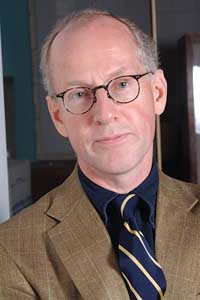 Theo van den Hout 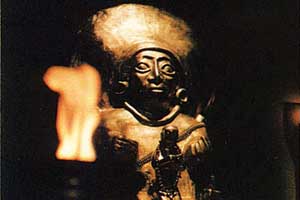 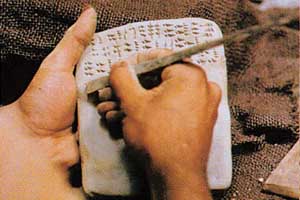 | |
A feature-length movie, The Hittites: The Empire that Changed The World will make its Midwest premiere at 7 p.m. Thursday, Nov. 11, in Breasted Hall at the Oriental Institute.
Theo van den Hout, Professor of Hittite and Anatolian Languages and Editor of the Chicago Hittite Dictionary, as well as Tolga Ornek, the film’s writer, director and producer, will speak after the showing at 9 p.m.
Van den Hout, whose commentary is included in the film, is among several interviewed experts with connections to the Oriental Institute, including Harry Hoffner, the John A. Wilson Professor Emeritus in the Oriental Institute and former Co-editor of the Chicago Hittite Dictionary; Gary Beckman, consultant to the Hittite dictionary; and Billie Collins, a former researcher with the dictionary.
Academy Award-winning actor Jeremy Irons narrates the film, which features a reenactment of the Battle of Kadesh, where Hittite armies clashed with Egyptian troops led by Pharaoh Ramses II.
The battle, fought in what is now Syria, took place in 1275 B.C. It is the earliest known battle in which true military tactics were used. The Hittite king, Muwatalli, ambushed the army of Ramses II, which included 1,500 chariots, each carrying three men.
A resulting treaty was the first superpower peace agreement in history and can been seen inscribed on temple walls in Luxor, Egypt, while the original tablet is on display at the Istanbul Archaeological Museum. A copy of the treaty hangs on the wall of the United Nations headquarters.
“It’s a film that is probably better called a docudrama,” van den Hout said. “The film follows, through reenactment, the lives of four kings and queens and inserts interviews from scholars, as well as footage from sights in the Middle East connected with the Hittites in Turkey, Syria and Egypt.
“This movie makes people aware of how important the Hittite empire was in the second millennium B.C. At one time, it was the leading power in the ancient Near East,” he said.
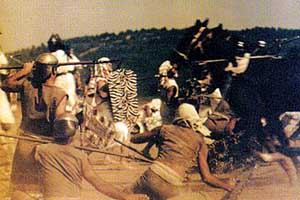  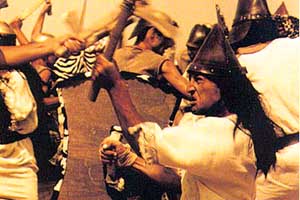 The battle fought in 1275 B.C. between the Hittite armies and Egyptian troops led by Pharaoh Ramses II, is reenacted in the film The Hittites: The Empire That Changed the World. | |
The Hittites ruled in central Anatolia, modern-day Turkey. Theirs is the oldest recorded Indo-European language, and many of their words, such as water, are similar to those in use today in English, a related language. The Hittites were also responsible for transferring traditions and myths between Mesopotamia and the West, to Greece and Rome, van den Hout said.
The University is one of the world’s centers for the study of the Hittites and their language, which was written on clay tablets in central Asia Minor from about 1650 to 1180 B.C. The vast majority of Hittite tablets were excavated from the ruins of the ancient Hittite capital Hattusa, located near the modern Turkish town of Boghazköy, about 130 miles east of Ankara.
In 1906, a German expedition began to excavate these ruins, where about 10,000 clay tablets inscribed with the familiar Assyro-Babylonian script were recovered. Today, over 30,000 tablets and fragments are known. Despite extensive scholarly work, no complete dictionary of the Hittite language was immediately produced.
The Chicago Hittite Dictionary Project officially started in 1975 with the awarding of a National Endowment for the Humanities grant to the dictionary’s first editors, Hoffner and Hans Gčterbock. It was conceived in answer to a recognized need for a Hittite-English lexical tool, which would aid lexicographical research of all Hittite texts.
So far, scholars have completed two volumes of the dictionary and are half way through completing a third. The massive project will eventually have 12 volumes and will take another 40 years to complete, van den Hout said.
![[Chronicle]](/images/sidebar_header_oct06.gif)